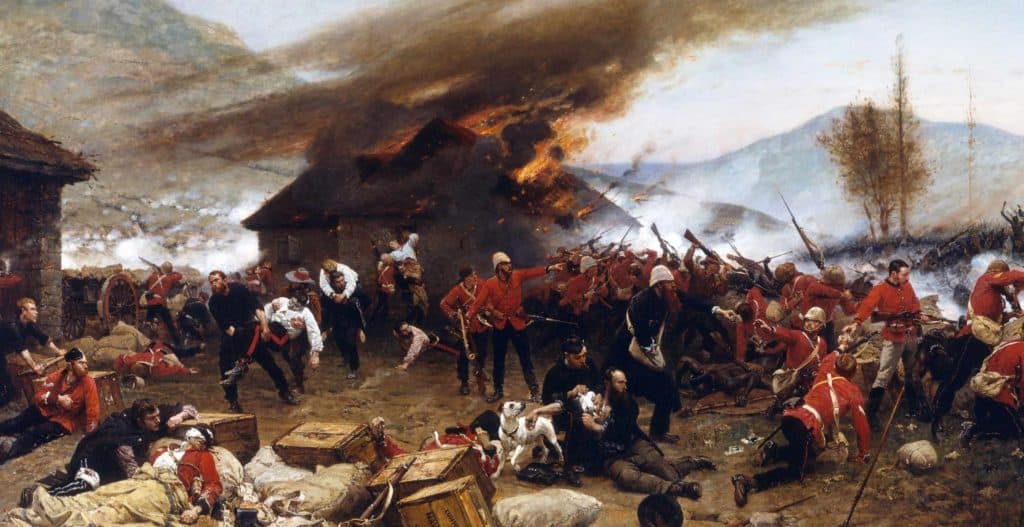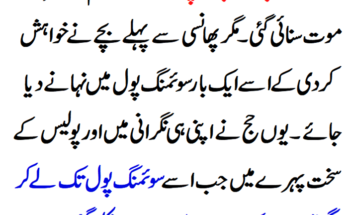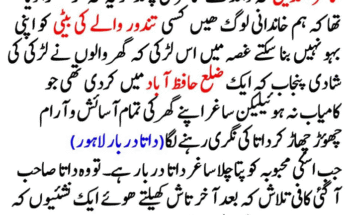The Brief Encounter: Zanzibar vs Great Britain – The World’s Shortest War
In the annals of history, the Zanzibar-Great Britain conflict stands as an extraordinary anomaly – a war so brief that its conclusion seems almost as swift as a heartbeat. In this article, we delve into the captivating narrative of the world’s shortest war, a remarkable event that unfolded in a matter of hours and left an indelible mark on the pages of history.
Setting the Stage: The Sultan’s Succession
A Succession Dispute Unfolds
The seeds of the Zanzibar-Great Britain conflict were sown in the political upheaval surrounding the succession of the Sultan of Zanzibar in 1896. The sudden death of Sultan Hamad bin Thuwaini prompted a succession dispute, as two claimants – Khalid bin Barghash and Hamoud bin Mohammed – vied for the throne. Britain’s interest lay in ensuring a ruler aligned with their colonial objectives, and they supported Hamoud’s claim.
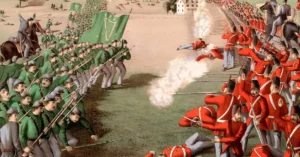
The Hour of Conflict: A Swift Showdown
The Sultan’s Ultimatum
Khalid bin Barghash, a contender for the throne, refused to accept Britain’s influence and demanded his ascendancy. As tensions escalated, Khalid fortified himself within the Sultan’s palace and raised the flag of defiance against British authority.
The Astonishing Onset
In a display of swift and resolute action, the British responded to Khalid’s defiance with unparalleled efficiency. On August 27, 1896, the British Royal Navy launched a bombardment against the Sultan’s palace, reducing it to rubble within minutes. Simultaneously, British forces engaged Zanzibar’s coastal defenses, rendering them ineffective.
نسانی تاریخ کی سب سے مختصر جنگ جو صرف 38 منٹ میں ہی ختم ہو گئی
کوئی بھی جنگوں کو پسند نہیں کرتا۔ لیکن ان کے پیچھے کی کہانیاں ہم میں سے بیشتر کو دلچسپ بناتی ہیں۔ اگر آپ تاریخ میں لڑی جانے والی لڑائیوں کی کہانیوں کے بارے میں جاننا چاہتے ہیں تو ہمارے پاس آپ کے لیے ایک دلچسپ کہانی ہے۔ یہاں، ہم تاریخ کی سب سے مختصر جنگ، اینگلو-زنزیبار جنگ کے بارے میں بات کرنے جا رہے ہیں۔ یہ صرف 38 منٹ تک جاری رہی
جنگ کیوں ہوئی اور اس کے مختصر دورانیہ کی وجہ کیا تھی
اینگلو-زنزیبار جنگ
تاریخ کی بہت سی کتابوں میں 1896 میں ہونے والی اینگلو-زنزیبار جنگ کے بارے میں بات نہیں کی گئی ہے۔ اگرچہ مختصر مدت کے باوجود اس جنگ کا بھی ایک دلچسپ پس منظر ہے۔ 1890 میں برطانیہ اور جرمنی کے درمیان اینگلو-زنزیبار نامی ایک معاہدہ ہوا۔ اس معاہدے کی شرائط کے مطابق مشرقی افریقہ میں اثر و رسوخ رکھنے والی ان سامراجی طاقتوں کو حکومت کرنے کے لیے مخصوص علاقے دیے گئے تھے۔ جبکہ زنجبار برطانویوں کو پیش کیا گیا، سرزمین تنزانیہ کا ملحقہ علاقہ جرمنوں کو دے دیا گیا۔
اس کے بعد، انگریزوں نے زنجبار کو برطانوی سلطنت کا براہ راست محافظ قرار دیا۔ انہوں نے اس علاقے پر حکمرانی کے لیے زنجبار کے 5ویں سلطان حماد بن ثوینی کا انتخاب کیا۔ یہ کہنے کی ضرورت نہیں کہ وہ مکمل طور پر انگریزوں کے کنٹرول میں تھا۔ تاہم، اس کی پرامن حکمرانی کا اچانک خاتمہ اس وقت ہوا جب اگست 1896 میں اس کا انتقال ہوگیا۔م
زنجبار میں تعینات برطانوی سفارت کار کے ساتھ ٹھیک نہیں تھا، اور باسل غار نامی سرداروں میں سے ایک نے خالد کو کھڑے ہونے کا حکم بھی دیا۔ لیکن خالد کے ذہن میں کچھ اور ہی منصوبے تھے۔ اس نے اپنی فوج جمع کرنا شروع کر دی اور جلدی سے اپنے محل کو مضبوط کر لیا۔ ایک ہفتے کے اندر، اس نے تقریباً 3000 شاہی سپاہی، بہت سی توپیں اور یہاں تک کہ قریبی بندرگاہ پر ایک شاہی کشتی بھی خرید لی تھی۔
نشان واضح تھا۔ خالد جنگ چاہتا تھا۔ انگریز بھی اتنی آسانی سے ہار ماننے والے نہیں تھے۔ چنانچہ وہ بھی اپنے جنگی جہاز اور فوج لے آئے۔ مقصد نہ صرف خالد کو معزول کرنا تھا بلکہ عام عوام کو فسادات سے روکنا بھی تھا۔ خالد کے پاس کھلی دشمنی دکھانے کا اختیار نہیں تھا۔ درحقیقت ایک برطانوی کمانڈر کو بھی تیار بیڑے کی ذمہ داری سنبھالنے کے لیے بھیجا گیا تھا۔
انگریزوں کے سامنے ایک واضح مشن تھا: خالد کو ہتھیار ڈالنے اور زنجبار پر دوبارہ کنٹرول حاصل کرنے پر مجبور کرنا. یہ وہ وقت ہے جب انگریزوں نے آخری جنگ کی گھنٹی بجائی
جنگ صرف 38 منٹ کیوں چلی؟
جب خالد نے برطانوی حکومت کے حتمی جنگ کا جواب دینے سے انکار کیا تو انہوں نے اپنے جہازوں کو محل پر گولی چلانے کا حکم دیا۔ دو منٹ کے اندر، خالد کے آدھے سے زیادہ ہتھیار تباہ ہو چکے تھے، اور جلد ہی لکڑی کا محل گرنا شروع ہو گیا، جس کے اندر 3000 محافظ زندہ رہنے کے لیے جدوجہد کر رہے تھے۔ درحقیقت، بمباری کے چند لمحوں کے اندر، خیال کیا جاتا تھا کہ خالد اپنی عزت کے دفاع کے لیے اپنے تمام وفادار رعایا کو تنہا چھوڑ کر پچھلے راستے سے فرار ہو گیا تھا۔ 40 منٹ سے بھی کم عرصے میں سلطان کا جھنڈا گرا دیا گیا اور تاریخ کی مختصر ترین جنگ شروع ہونے کے چند ہی منٹوں میں ختم ہو گئی۔ بدقسمتی سے اتنی مختصر جنگ میں بھی 500 ہلاکتیں ہوئیں۔
An Unprecedented Conclusion
The remarkable feat of the conflict lies in its astonishing brevity. The bombardment and naval action lasted a mere 38 minutes, marking the shortest recorded war in history. Khalid bin Barghash’s resistance crumbled as quickly as it had arisen, and he fled the palace. With his departure, British-supported Sultan Hamoud bin Mohammed assumed power, aligning with Britain’s colonial ambitions.
Aftermath and Legacy: Lessons of the Brief War
A Lesson in Diplomatic Resolve
The Zanzibar-Great Britain conflict serves as a testament to the power of swift and decisive action. The British demonstration of overwhelming force underscored the extent to which colonial powers were willing to protect their interests, even in far-flung territories.
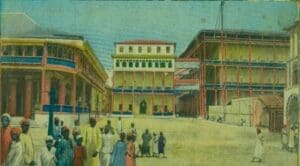
A Historical Footnote
Though it lasted mere minutes, the Zanzibar-Great Britain conflict remains a captivating historical footnote, offering insights into the complexities of colonial dynamics, power struggles, and the art of diplomacy. Its brevity stands as a testament to the unpredictable and often fleeting nature of conflict in an ever-evolving world.
Conclusion: A Blink in History’s Eye
As we reflect upon the Zanzibar-Great Britain conflict, we’re reminded that history’s most remarkable events often defy our expectations. In the span of 38 minutes, a narrative of power, resistance, and colonial influence unfolded, leaving an indelible mark on the annals of time. The world’s shortest war continues to captivate our imagination, serving as a reminder that in the tapestry of history, even the briefest encounters can shape the course of nations and the trajectory of our understanding of the past.

